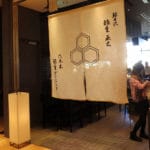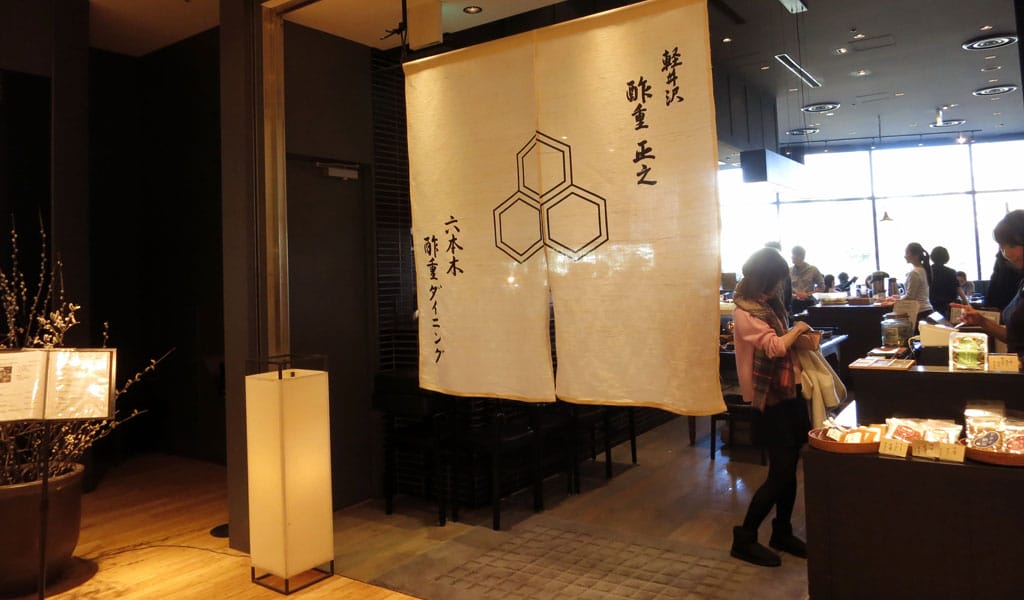Our introduction to Yakinikuen takes place on a Saturday night. Two German friends, former Tokyo residents and long-time fans of the restaurant, were determined to take an edible trip down memory lane.
“We’ll already be in the queue. Hurry!” they told us. Reservations at Yakinikuen, apparently, are only taken for weekdays before 7 p.m., and so they had lined up to secure a table. “It’s an underground joint with the best meat,” they said.
That was all we had been told. Normally, we might think twice before accepting an invitation to such a place. It sounded like we might be entering some kind of shady gangster-run establishment. Yet we were headed to a yakiniku – or Japanese barbecue restaurant –located in none other than Azabujuban, one of the toniest pockets of Tokyo, teeming with expats and embassies.
Interestingly, as we were to later discover, the restaurant’s founder had made a name for himself through being actively involved in the fight against the yakuza, the gangsters of Japan’s organized crime. So much for our B-movie fantasies.

Despite Yakinikuen’s evident popularity, we were impressed our friends had discovered it in the first place. Not only is the shop tucked away in a basement, but it’s completely incongruous with the surrounding area. Azabujuban is not the kind of area where one goes hunting for a cheap and cheerful meal.
As we head towards Yakinikuen, we initially wonder if we are headed the right way. Yet soon we spy the entrance – a mildly garish glowing white sign – below which we descend a steep staircase
The restaurant is a flurry of activity. A wide room is packed with people of all ages – families with young children; businessmen downing beers; young couples on dates – all sat around open grills, frying up various cuts of meat at varying paces, a satisfying sizzle permeating the chatter.

Yakinikuen is clearly adored, and it’s easy to see why. Beyond its welcoming atmosphere, it has excellent kosupa – the Japanese word for “cost-performance.” The meat quality is exceptional and the prices exceptionally low.
It’s part of a small chain with just a handful of branches scattered across the Tokyo area. The man behind it is Teruo Miyamoto, who passed away in 2019 at the age of 80. He boasted an interesting career of establishing more than 50 restaurants and bars under different brands, while taking a hardline stance on the yakuza and organized crime. He published several books on his experiences and the harassment he ensured; his publisher’s profile states he cooperated with the police to help arrest more than 100 yakuza and other delinquent customers who made trouble at his restaurants.
It seems Miyamoto also truly mastered the art of capturing people’s stomach; it’s safe to say that Yakinikuen Azabujuban is a true local institution. In June this year, it celebrated 23 years of business, a fact of which store manager Kei Okamura is proud of.

“The atmosphere hasn’t changed much since we started. It has always been a yakiniku restaurant with the general public in mind,” Okamura says. “At the beginning, our customers were mainly local families, business people and groups of youngsters. Basically, people saw it as a really cheap restaurant. But since 2017, Miyamoto’s eldest son has gotten actively involved in the management of the business, and has been trying to expand our customer base. Personally, I’m trying to appeal to customers in their forties and fifties and make a good atmosphere and menu for them.”
Yakiniku as a genre owes its heritage to Koreans living in Japan post-World War II, who, during a time of food scarcity, began grilling meat and offal for hungry customers. Initially it was referred to simply as “Korean cuisine,” but the Korean War of 1950-1953 and subsequent ideological divide between North Korea and South Korea led to calls for a more neutral term, so the direct translation of bulgogi (Korean grilled beef) was adopted. Yakiniku literally means “grilled meat.”

Yakinikuen has all the hallmarks of a classic yakiniku restaurant and expertly executes them, as well as throwing in some surprises.
We begin with an excellent homemade kimchi selection and namul, assorted Korean vegetables, before ordering meat by the plate.
First up, kalbi is a must – thinly sliced and marinated in sweet-salty sauce, lightly garlicky. Then, another favorite – harami, skirt steak, cut in a thick chunk, well-marbled with fat, only served with salt. This has to be compared with the leaner rosu, sirloin, and one of the store’s most popular menu items – thin slices of beef tongue.
We mix and match, throwing slices onto the central round shichirin grill, turning them carefully, cooking each piece to our liking. It’s hard to go wrong – even the leaner sirloin was juicy and tender. There are different condiments and sauces, of course, to change up each mouthful, but none can rival the jar of spicy magic that sits on every table. It’s called “Teruojan” – a portmanteau of Teruo, the founder’s first name, and gochujang, a spicy red Korean chili paste. The store keeps their recipe a closely guarded secret, but it’s so delicious, we almost want to eat it straight from the spoon.

It pairs amazingly with their stone-cooked bibimbap, which arrives sizzling, and only sizzles more when mixing in the generous array of pickled vegetables, kimchi and egg. Yet the bibimbap – which at other restaurants is often a little bland – holds its own, and does well to balance the richness of the meat. We order a second with no shame. We plan to sample the gukbap, Korean hot soup with rice, or reimen, chilled noodles in broth topped with kimchi, on our next visit.
The biggest surprise of the evening is the drinks list. For yakiniku restaurants at this price point (less than around 5000 JPY / 34 USD per person), the menu usually offers simply beer, basic cocktails, and perhaps makkoli, a milky-white traditional Korean alcoholic drink made by fermenting rice. If there’s wine on the menu, it’s typically a choice of just a basic red or white.

Yet, Yakinikuen has a menu that not only features some very admirable choices by the bottle, but “premium” wine by the glass selected by the manager. On inquiring, Okamura appears and earnestly gives us a comprehensive lowdown of four options of high-quality wine, replete with tasting notes. We are served a sublimely well-balanced Burgundy from 2006 that’s so good we have to photograph the bottle for future reference.
“When I go out to eat with my family, I want to drink good wine but most places only sell it by the bottle,” Okamura says, explaining the concept behind high quality options by the glass. He visits wine shops himself to consult with staff and select the line-up for the restaurant.
With good quality, affordable yakiniku, a social style of dining and excellent wine, Yakinikuen offers a winning combination. In the upscale alleys of Azabujuban, it feels like a secret refuge.
That’s precisely what Okamura is proud of. “It’s an unpretentious place that you can stop by casually,” he enthuses. “You can enjoy a nostalgic atmosphere with your friends while listening to nineties background music, and at the same time taste the authentic taste of yakiniku.”
Yakinikuen Azabujuban may be literally underground, but its cooking and business practices are without a doubt above board.
 February 29, 2024 Miura
February 29, 2024 Miura
The Japanese philosophy of ikigai follows four key tenets: to find in life what we love, […] Posted in Tokyo October 20, 2022 Tempura Dining Itoi: Tempura for the Times
October 20, 2022 Tempura Dining Itoi: Tempura for the Times
It might easily be mistaken for a hipster café. From the street in buzzing Shinjuku City […] Posted in Tokyo June 14, 2021 Suju Dining Rokkaku
June 14, 2021 Suju Dining Rokkaku
Many people think of miso as the soup that gets tacked onto every Japanese meal. We can […] Posted in Tokyo
Published on October 20, 2023
Related stories
February 29, 2024
TokyoThe Japanese philosophy of ikigai follows four key tenets: to find in life what we love, what the world needs, what we are good at and what we can get paid for. At Miura, chef and owner Hiroki Nara has found ikigai through his stunning gourmet fish restaurant. This idyllic little secret is tucked into…
October 20, 2022
TokyoIt might easily be mistaken for a hipster café. From the street in buzzing Shinjuku City ward, a large window illuminates an open kitchen where Yuichi Itoi, sporting a baseball cap, white T-shirt and piercings, is prepping ingredients. As we step inside, we’re greeted by the sound of low-key hip-hop and the chatter of two…
June 14, 2021
TokyoMany people think of miso as the soup that gets tacked onto every Japanese meal. We can still remember our first experience of Japanese food in the West, when the waiter brought the soup at the end of the meal, and someone thought he’d forgotten to serve it at the beginning. Any self-respecting Japanese meal,…























































































